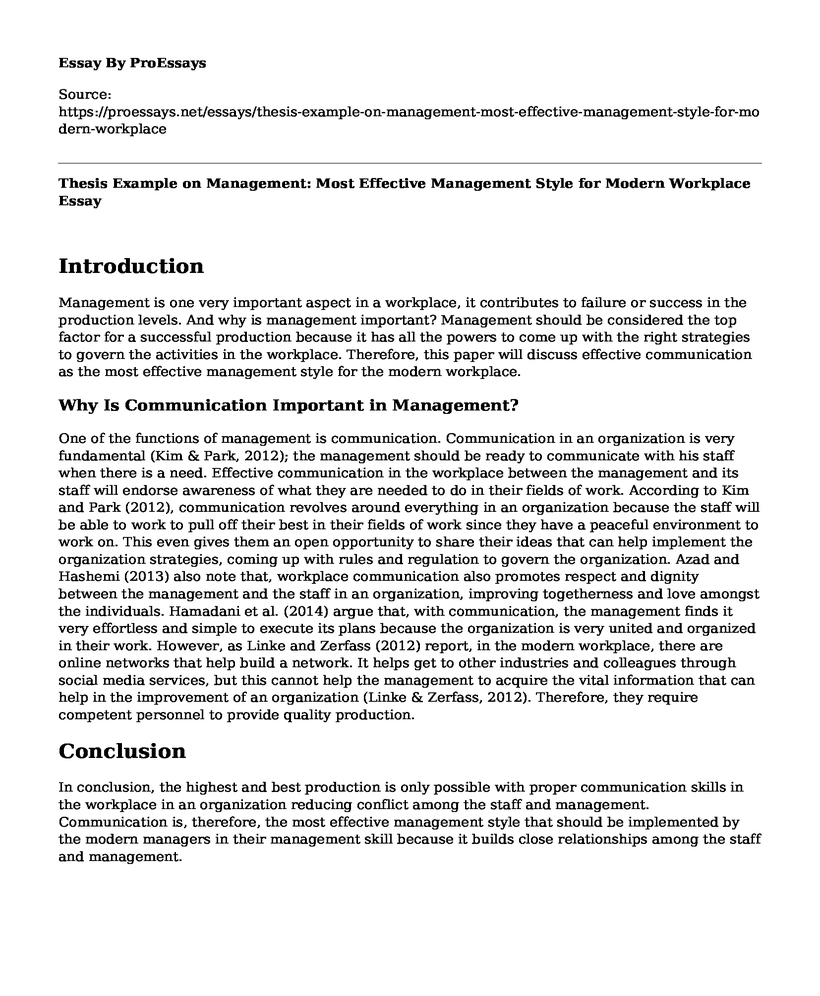Introduction
Management is one very important aspect in a workplace, it contributes to failure or success in the production levels. And why is management important? Management should be considered the top factor for a successful production because it has all the powers to come up with the right strategies to govern the activities in the workplace. Therefore, this paper will discuss effective communication as the most effective management style for the modern workplace.
Why Is Communication Important in Management?
One of the functions of management is communication. Communication in an organization is very fundamental (Kim & Park, 2012); the management should be ready to communicate with his staff when there is a need. Effective communication in the workplace between the management and its staff will endorse awareness of what they are needed to do in their fields of work. According to Kim and Park (2012), communication revolves around everything in an organization because the staff will be able to work to pull off their best in their fields of work since they have a peaceful environment to work on. This even gives them an open opportunity to share their ideas that can help implement the organization strategies, coming up with rules and regulation to govern the organization. Azad and Hashemi (2013) also note that, workplace communication also promotes respect and dignity between the management and the staff in an organization, improving togetherness and love amongst the individuals. Hamadani et al. (2014) argue that, with communication, the management finds it very effortless and simple to execute its plans because the organization is very united and organized in their work. However, as Linke and Zerfass (2012) report, in the modern workplace, there are online networks that help build a network. It helps get to other industries and colleagues through social media services, but this cannot help the management to acquire the vital information that can help in the improvement of an organization (Linke & Zerfass, 2012). Therefore, they require competent personnel to provide quality production.
Conclusion
In conclusion, the highest and best production is only possible with proper communication skills in the workplace in an organization reducing conflict among the staff and management. Communication is, therefore, the most effective management style that should be implemented by the modern managers in their management skill because it builds close relationships among the staff and management.
References
Azad, N., & Hashemi, S. (2013). A study on important factors influencing customer relationship management: A case study of Mobile service providers. Management Science Letters, 3(4), 1161-1166.
Hamadani Janes, S., Patrick, K., & Dotsika, F. (2014). Implementing a social intranet in a professional services environment through Web 2.0 technologies. The Learning Organization, 21(1), 26-47.
Kim, Y., & Park, M. S. (2012). Are all management earnings forecasts created equal? Expectations management versus communication. Review of Accounting Studies, 17(4), 807-847.
Linke, A., & Zerfass, A. (2012). Future trends in social media use for strategic organisation communication: Results of a Delphi study. Public Communication Review, 2(2).
Cite this page
Thesis Example on Management: Most Effective Management Style for Modern Workplace. (2021, Apr 19). Retrieved from https://proessays.net/essays/thesis-example-on-management-most-effective-management-style-for-modern-workplace
If you are the original author of this essay and no longer wish to have it published on the ProEssays website, please click below to request its removal:
- IKEA: Business Ideas and Strategies. Management Essay Example.
- The Budgeting and Financial Planning Approach for A2 Milk Company
- Key Issues, Problems and Opportunities of Jimmy Badger Case of Leadership
- Leadership Program Participation for the International Students in Comparison With Domestic Students
- Litereary Analysis Essay on Act Like a Leader, Think Like a Leader
- Essay on Codes of Ethics: A Guide to Leaders & Human Resources Management
- Paper Example on 19-Year-Old Paralyzed After Trampoline Park Accident







